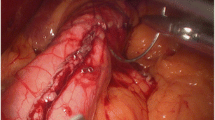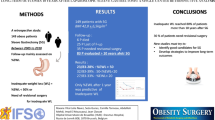Abstract
Background
Although weight loss following laparoscopic sleeve gastrectomy (LSG) can be substantial, weight recidivism is still a major concern. The aim of our work is to study early weight recidivism following LSG and to evaluate the role of gastric computed tomography volumetry (GCTV) in the assessment of patients experiencing early weight regain.
Methods
One-hundred and one morbidly obese patients undergoing LSG were prospectively studied. Patients were followed up for 2 years. Those who presented with weight recidivism were counseled for dietary habits and assessed for the amount of weight regain. Patients who regained weight were scheduled for GCTV.
Results
Twelve patients were excluded from the study. Weight recidivism was reported in 9/89 patients (10.1 %) [weight loss failure (n = 1), weight regain (n = 8)] and was almost always first recognized 1½–2 years after LSG. The amount of weight regain showed negative correlations with preoperative body weight and body mass index (r = −0.643, P = 0.086 and r = −0.690, P = 0.058; respectively) and positive correlations with the distance between the pylorus and the beginning of the staple line (r = 0.869, P = 0.005), as well as with the residual gastric volume (RGV) on GCTV 2 years after LSG (r = 0.786, P = 0.021).
Conclusions
In the small group of patients who regained weight, a longer distance between the pylorus and the beginning of the staple line, as well as a higher RGV on GCTV 2 years after LSG, were both associated with increased weight regain. Gastric computed tomography volumetry with RGV measurement holds promise as a useful research tool after LSG.




Similar content being viewed by others
References
Prentice AM. The emerging epidemic of obesity in developing countries. Int J Epidemiol. 2006;35:93–9.
Santry HP, Gillen DL, Lauderdale DS. Trends in bariatric surgical procedures. JAMA. 2005;294:1909–17.
Frezza EE. Laparoscopic vertical sleeve gastrectomy for morbid obesity. The future procedure of choice? Surg Today. 2007;37:275–81.
Marceau P, Hould FS, Simard S, et al. Biliopancreatic diversion with duodenal switch. World J Surg. 1998;22(9):947–54.
Langer FB, Bohdjalian A, Felberbauer FX, et al. Does gastric dilatation limit the success of sleeve gastrectomy as a sole operation for morbid obesity? Obes Surg. 2006;16:166–71.
Cottam D, Qureshi FG, Mattar SG, et al. Laparoscopic sleeve gastrectomy as an initial weight-loss procedure for high-risk patients with morbid obesity. Surg Endosc. 2006;20(6):859–63.
Iannelli A, Schneck AS, Noel P, et al. Re-sleeve gastrectomy for failed laparoscopic sleeve gastrectomy: a feasibility study. Obes Surg. 2011;21:832–5.
Baltasar A, Serra C, Pérez N, et al. Re-sleeve gastrectomy. Obes Surg. 2006;16(11):1535–8.
Deitel M, Crosby RD, Gagner M. The first international consensus summit for sleeve gastrectomy (SG), New York City, October 25–27. Obes Surg. 2007;18:487–96.
Johnston D, Dachtler J, Sue-Ling HM, et al. The Magenstrasse and Mill operation for morbid obesity. Obes Surg. 2003;13(1):10–6.
Gautier T, Sarcher T, Contival N, et al. Indications and mid-term results of conversion from sleeve gastrectomy to Roux-en-Y gastric bypass. Obes Surg. 2013;23:212–5.
Jiménez A, Casamitjana R, Flores L, et al. Longterm effects of sleeve gastrectomy and Roux-en-Y gastric bypass surgery on type 2 diabetes mellitus in morbidly obese subjects. Ann Surg. 2012;256:1023–9.
Karmali S, Brar B, Shi X, et al. Weight recidivism post-bariatric surgery: a systematic review. Obes Surg. 2013;23:1922–33.
Deguines JB, Verhaeghe P, Yzet T, et al. Is the residual gastric volume after laparoscopic sleeve gastrectomy an objective criterion for adapting the treatment strategy after failure? Surg Obes Relat Dis. 2013;9(5):660–6.
Colquitt JL, Picot J, Loveman E, et al. Surgery for obesity. Cochrane Database Syst Rev. 2009;2, CD003641.
Kessler RM, Eckstein B. Obesity: health insurance plans respond to a public health challenge. AHIP Cover. 2005;46(2):38–40. 42.
Maggard MA, Shugarman LR, Suttorp M, et al. Meta-analysis: surgical treatment of obesity. Ann Intern Med. 2005;142(7):547–59.
Christou NV, Look D, MacLean LD. Weight gain after short and long-limb gastric bypass in patients followed for longer than 10 years. Ann Surg. 2006;244:734–40.
Margo DO, Geloneze B, Delfini R, et al. Long-term weight regain after gastric bypass: a 5-year prospective study. Obes Surg. 2008;18:648–51.
Langer FB, Bohdjalian A, Shakeri-Leidenmühler S, et al. Conversion from sleeve gastrectomy to Roux-en-Y gastric bypass—indications and outcome. Obes Surg. 2010;20:835–40.
Bohdjalian A, Langer FB, Shakeri-Leidenmühler S, et al. Sleeve gastrectomy as sole and definitive bariatric procedure: 5-year results for weight loss and ghrelin. Obes Surg. 2010;20:535–40.
D’Hondt M, Vanneste S, Pottel H, et al. Laparoscopic sleeve gastrectomy as a single-stage procedure for the treatment of morbid obesity and the resulting quality of life, resolution of comorbidities, food tolerance, and 6-year weight loss. Surg Endosc. 2011;25(8):2498–504.
Greenstein AJ, Jacob BP. Placement of a laparoscopic adjustable gastric band after failed sleeve gastrectomy. Surg Obes Relat Dis. 2008;4:556–8.
Switzer NJ, Karmali S. The sleeve gastrectomy and how and why it can fail? Surg Curr Res. 2014;4:3.
AbuJaish W, Rosenthal RJ. Sleeve gastrectomy: a new surgical approach for morbid obesity. Expert Rev Gasroenterol Hepatol. 2010;4(1):101–19.
Myronovych A, Kirby M, Ryan KK, et al. Vertical sleeve gastrectomy reduces hepatic steatosis while increasing serum bile acids in a weight-loss-independent manner. Obesity. 2014;22(2):390–400.
Kandeel AA, Sarhan MD, Hegazy T, et al. Comparative assessment of gastric emptying in obese patients before and after laparoscopic sleeve gastrectomy using radionuclide scintigraphy. Nucl Med Commun. 2015;36(8):854–62.
Mehran A, Koleilat A. Sleeve gastrectomy failure: just when we thought we had the perfect operation. Bariatric Times. 2010;7:16–7.
Ashrafian H, le Roux CW. Metabolic surgery and gut hormones—a review of bariatric entero-humoral modulation. Physiol Behav. 2009;97:620–31.
Zundel N, Hernandez JD. Revisional surgery after restrictive procedures for morbid obesity. Surg Laparosc Endosc Percutan Tech. 2010;20:338–43.
Weiner RA, Weiner S, Pomhoff I, et al. Laparoscopic sleeve gastrectomy—influence of sleeve size and resected gastric volume. Obes Surg. 2007;17:1297–305.
Braghetto I, Cortes C, Herquiñigo D, et al. Evaluation of the radiological gastric capacity and evolution of the BMI 2–3 years after sleeve gastrectomy. Obes Surg. 2009;19:1262–9.
Gagner M, Rogula T. Laparoscopic reoperative sleeve gastrectomy for poor weight loss after biliopancreatic diversion with duodenal switch. Obes Surg. 2003;13:649–54.
Ochner CN, Jochner MC, Caruso EA, et al. Effect of preoperative body mass index on weight loss after obesity surgery. Surg Obes Relat Dis. 2013;9(3):423–7.
Braghetto I, Davanzo C, Korn O, et al. Scintigraphic evaluation of gastric emptying in obese patients submitted to sleeve gastrectomy compared to normal subjects. Obes Surg. 2009;19:1515–21.
Melissas J, Daskalakis M, Koukouraki S, et al. Sleeve gastrectomy—a “food limiting” operation. Obes Surg. 2008;18:1251–6.
Bernstine H, Tzioni-Yehoshua R, Groshar D, et al. Gastric emptying is not affected by sleeve gastrectomy—scintigraphic evaluation of gastric emptying after sleeve gastrectomy without removal of the gastric antrum. Obes Surg. 2009;19:293–8.
Kim WW, Gagner M, Kini S, et al. Laparoscopic vs. open biliopancreatic diversion with duodenal switch: a comparative study. J Gastrointest Surg. 2003;7:552–7.
Author information
Authors and Affiliations
Corresponding author
Ethics declarations
Conflict of Interest
The authors declare that they have no conflict of interest.
Ethical Approval
All procedures performed in studies involving human participants were in accordance with the ethical standards of the institutional and/or national research committee and with the 1964 Helsinki declaration and its later amendments or comparable ethical standards.
Informed Consent
Informed consent was obtained from all individual participants included in the study.
Rights and permissions
About this article
Cite this article
Fahmy, M.H.A., Sarhan, M.D., Osman, A.M.A. et al. Early Weight Recidivism Following Laparoscopic Sleeve Gastrectomy: A Prospective Observational Study. OBES SURG 26, 2654–2660 (2016). https://doi.org/10.1007/s11695-016-2165-5
Published:
Issue Date:
DOI: https://doi.org/10.1007/s11695-016-2165-5




